My friend Martin, who had just purchased his first few vinyl albums and his first record player, asked me how he should store his vinyl records as he was a complete newbie and wanted my help. I told him everything, like keeping the records at the appropriate temperature, ensuring the environment is not too humid, and the records don’t come in direct contact with sunlight and heat, and vertically filing them rather than keeping them flat for a more extended period.
These were the things that I followed myself to ensure that my vinyl stayed in the best shape.
At that very moment, the thought of writing this blog came to my mind. My inner voice said there could be more people out there who have the same question but don’t have a friend like me to help them.
Here I am to help everyone who has the same doubts and can benefit from my years of experience, learnings from a few damaged records and knowledge.
Things to keep in mind before storing vinyl records
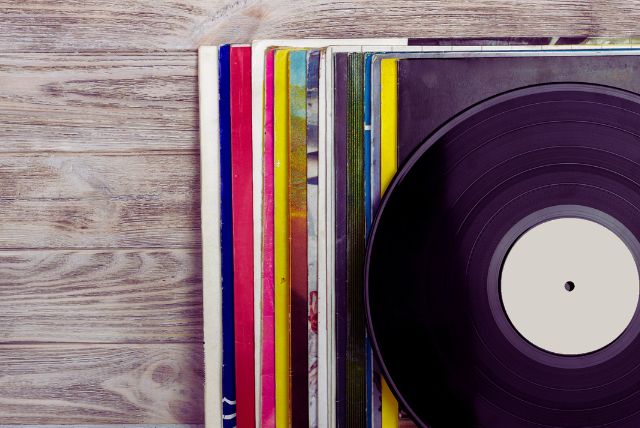
Before you go ahead and store your LPs, there are a few conditions that you should consider to keep your records vibrant and in the best shape.
Maintain right temperature
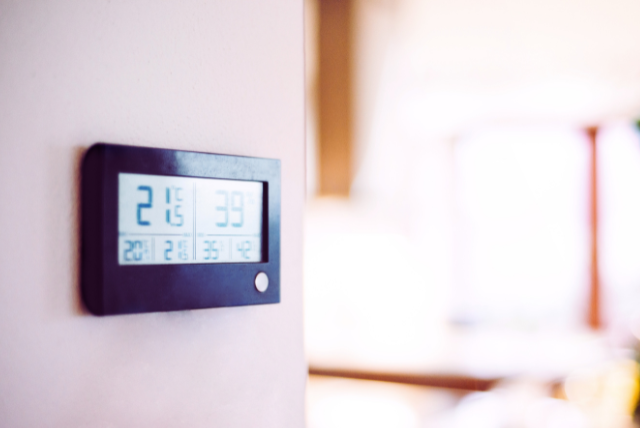
We all know that records are made up of PVC (polyvinyl chloride), a type of plastic. Products made of PVC, like wall panels, pipes, etc., are famous for lasting longer.
But like every other thing, PVC also has a weak spot. It cannot last against temperatures more than 140 °F (60 °C), and if your vinyl records are exposed to this temperature for a period of time, you may start to see them warp.
Usually, no corner of your house will reach this temperature until you are experiencing a severe heat wave and your air conditioning is not working. But sometimes, we store our records in poorly insulated corners like car trunks, garages, and attics where temperatures reach up to 140 °F.
It is advised to keep your records in an environment where the temperature stays between 65 to 70 °F (18-21°C).
To maintain the right temperature, try investing in a WIFI thermometer that gives you an alert whenever the temperature goes beyond 65°F.
Keep away from humidity and water
Among temperature, the right humidity is also extremely important to ensure the longevity of your vinyl collection. Humidity above 45% to 50% can attract mildew and mold. The record can become unplayable if too much mold accumulates in the vinyl grooves.
It also affects your record sleeves, which can become easily fall apart.
The most practical way to fix this problem is to keep your LPs in a place where humidity is maintained between the desired levels. A hygrometer is an ideal device to track humidity levels where you store your records.
Remember to keep your records in a cool, dry place away from the water pipes or where there is a slight possibility of water leakage that can damage your records.
Protect from direct sunlight
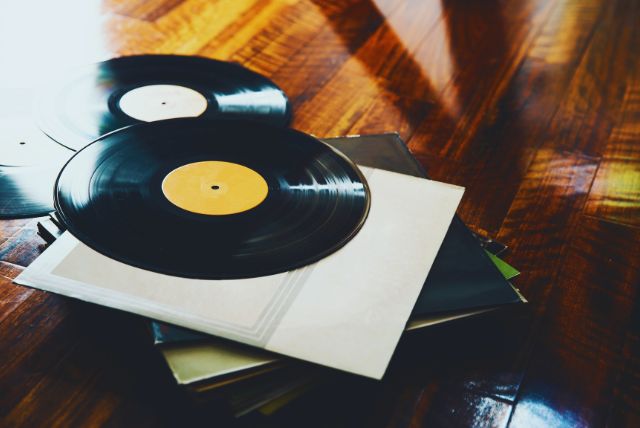
There is nothing better than a room full of natural sunlight if you are deprived of vitamin D. Where sunlight is good for your bone health, it is terrible for your vinyl collection. Why? Because of two things that come with the sunlight: ultraviolet rays and heat.
While heat from the sunlight can cause your LPs to warp, ultraviolet rays can affect your album artwork. By keeping your records away from direct sunlight, you can protect them from heat and keep the album artwork as good as new.
Dust-free environment
Keeping and playing your records in a dust-free environment is equally important as maintaining the appropriate temperature and humidity for them.
A dust-free environment has its benefits. Your LPs are protected from unnecessary dust and debris that can settle in vinyl grooves and cause distortion in noise over time.
Bonus Tip: Clean your records at least once every two weeks to remove any accumulated dust or debris during playbacks.
Here is a guide on different methods to clean your vinyl collection. Check it out!
How to store vinyl records with their sleeves correctly for the long term?
Once you have figured out the appropriate place, considering all the conditions I mentioned earlier, you are ready to move on to the following steps to store your LPs.
Clean before storing
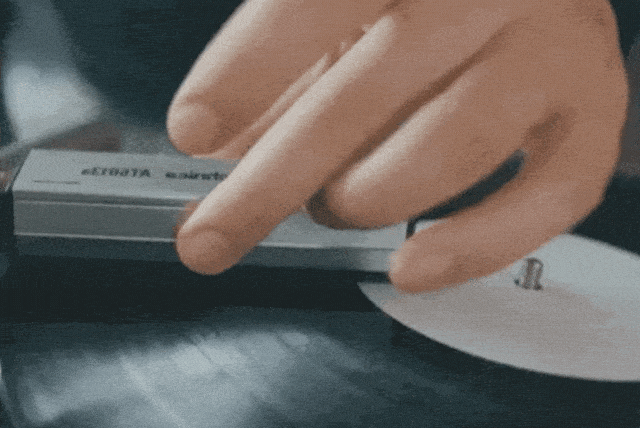
Before you keep your records in a sleeve and store them, it is advised to give them a proper cleaning treatment to prevent them from dust and mold.
Another thing that you should take care of is keeping your records from lying on the turntable, even if you have a dust cover. Always keep your records in their original sleeves to protect them from dust.
Use plastic instead of paper sleeves
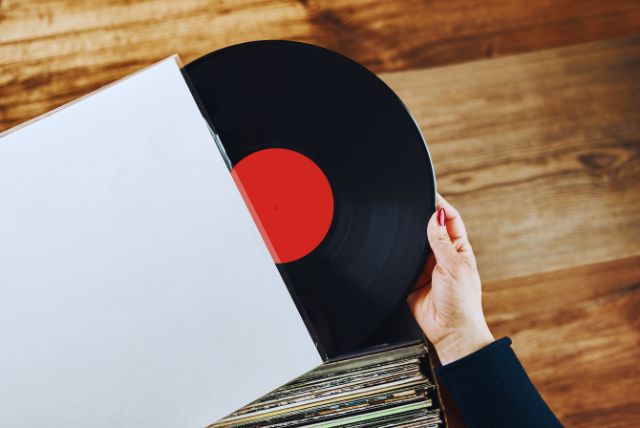
The next best thing you can do to store your vinyl appropriately is to replace the paper sleeves of the record with a plastic one. Why? Because paper sleeves, over time, can attract mold onto them because of their organic composition. They are also rough and can cause scratches to the vinyl surface.
Another thing you should keep in mind is not to put records in the cardboard sleeves directly. The cardboard sleeves act as sandpaper to the record’s surface and can cause severe damage if the records are kept without a sleeve.
Store vertically
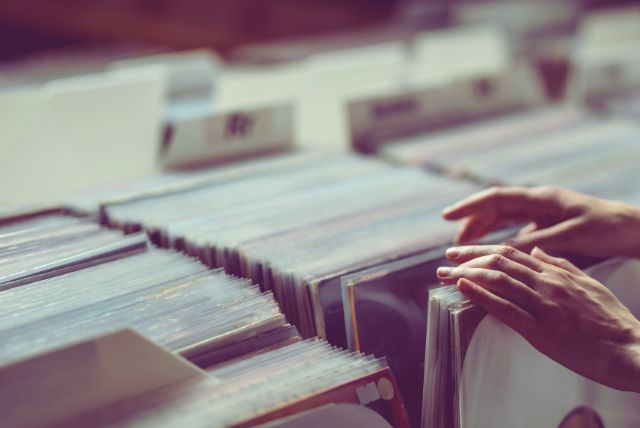
Always keep your records vertically, like your books on a bookshelf, rather than flat and piled up on one another. Vertically storing LPs ensures they are protected from warping and any physical damage from excess pressure.
Another benefit of vertically storing records is that they are much easier to pull out and listen to as compared to when they are stacked on one another.
Don’t let your records lean on one side
Always remember when you purchase a rack or create your vinyl shelf, the records should be stored in a way so that they don’t lean and put pressure on the record at one corner.
If you have a leaning issue with your records, buy a divider for your LPs to fix the problem.
Final suggestion
Vinyls are delicate and can be damaged easily, especially when exposed to conditions like high temperature, humidity, sunlight and improper filing.
They require proper care and handling to play music for extended periods. If you think it’s too much to take care of, switch to a new hobby.
Being a vinyl enthusiast comes with its pain, and storing and handling vinyls appropriately is one of them.
Must read:
Tips to maintain your vinyl records and maximize their longevity
Frequently Asked Questions
Q: How to store vinyls so they don’t warp?
Always try to store vinyl records in an upright, vertical position. This helps prevent unnecessary warping and damage and also preserves them for a longer period of time.
Q: Is it OK to lay vinyls flat?
Never store your vinyl records stacked flat or horizontally on top of each other, as this can lead to warping and eventually damage records.
Q: Is it bad to hang vinyls on wall?
It totally depends on how you store(hang) them. If you keep them in a vertical position, at the right temperature and humidity, and away from sunlight and dust, there shouldn’t be any problem.
Q: Does stacking records damage them?
Yes, stacking records on one another can lead to warping and damage them over time.
Q: Is it better to store vinyl records flat or upright?
Always store vinyl records in an upright, vertical position rather than stacking them flat on top of one another. An upright vertical position makes them easy to pull out and protects them from unnecessary warping due to pressure.
Q: What is the best environment for vinyl records?
Dry environments with a humidity level of 40-50% and a temperature between 60°F and 70°F (15°C and 21°C) are best for vinyl records.
Q: Is it bad to touch records?
Yes, it’s bad to touch your records because when you touch them with your bare hands, it leaves dirt, oil and grime on the record surface and increases the risk of them getting damaged.


